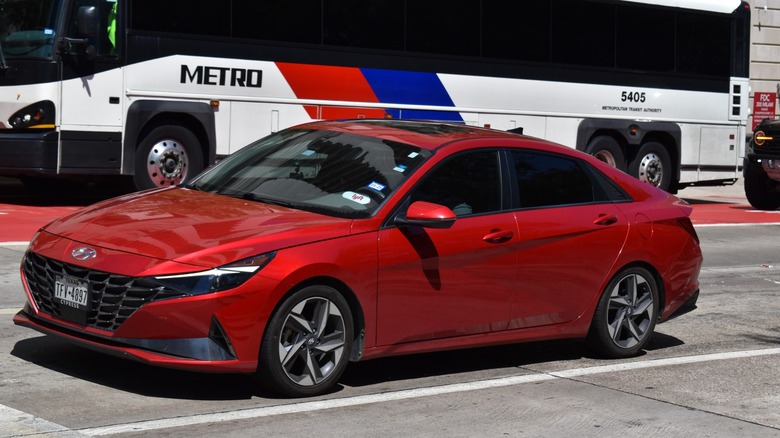Consumer Reports Says This Affordable Vehicle Brand Makes One Of The Most Reliable Cars
In 1986, Hyundai launched the second-cheapest car the United States had ever seen: The Hyundai Excel, which had an MSRP of $4,995 (about $14,800 in 2025). Since then, it's doubled down on the affordability strategy to undercut budget car competitors like Honda and Toyota. In fact, Hyundai Motor Group's average transaction price as of April 2025 was about $37,674 (via Cox Automotive), whereas the industry average hovers just under $50,000. As such, you'll find multiple Hyundai models on Consumer Reports' list of best cheap cars.
Historically, though, Hyundai's reliability — especially on Consumer Reports' findings — has had mixed receptions; the cars were cheap, but their reliability remained questionable. But that's been changing in recent years, and now, some of Hyundai's offerings are outranking those of rivals. Hyundai Motor Group placed second among mass market brands in the 2025 J.D. Power U.S. Initial Quality Study, and now the Hyundai Elantra Hybrid ranks seventh on Consumer Reports' 2025 list of the 10 most reliable cars, with an aggregated reliability score of 79 out of 100.
Consumer Reports calculates this score based on member survey data from hundreds of thousands of vehicles. It tracks 20 trouble areas across vital parts of cars, including transmission, cooling, brakes, engine, body hardware, and, for electrified cars, motor, battery, and charging. The Elantra Hybrid is the only Hyundai that made the list, and with its $25,450 starting price, it's tied for third as the cheapest on the list, after the Toyota Corolla and Toyota Corolla Hybrid.
What's the Hyundai Elantra Hybrid like?
Despite not making Consumer Reports' reliability list this year, the non-hybrid Hyundai Elantra is already one of the most reliable cars to buy used. The hybrid shares the same body shell, using the same third-generation K3 compact platform. Therefore, they share the same size and space: 99.4 cubic feet for passenger volume and 14.2 cubic feet for cargo. They also have the same general features and infotainment systems, which means the hybrid carries over some of the reliability from the gas version. However, the Elantra Hybrid brings its own hybrid powertrain and a new multilink rear suspension system, which experts say should be a notable improvement from the torsion beam system used in the basic non-hybrid version.
Reviews, like the one on Car and Driver, don't tout this as an exciting car to drive; the emphasis is on looks, economy, efficiency, and everyday comfort. The Elantra Hybrid pairs a relatively weak 1.6-liter Atkinson-cycle four-cylinder engine with a 32kW electric motor and a six-speed dual-clutch automatic transmission, producing a combined 139 horsepower. It may not be built for speed and excitement, but drivers praise it for its smooth ride and stellar fuel economy — up to 54 miles per gallon for city and highway combined on the base Blue trim, according to the Environmental Protection Agency (EPA). It's a solid choice for non-enthusiast retirees or economy daily drivers who need something affordable, reliable, and comfortable.
The cost of buying and maintaining a Hyundai Elantra Hybrid
The 2025 Elantra Hybrid comes in three trims: base Blue with a starting MSRP of $25,450, SEL Sport with a starting MSRP of $27,425, and Limited with a starting MSRP of $29,800. All in all, these prices are competitive for new hybrid sedans, since the base trim undercuts both the Civic Hybrid and Prius — the only way to really get much lower is to buy used but cheap hybrids, which can dip well under $15,000. The Sport doesn't come with better specs but adds gloss black wheels, a spoiler, sport pedals, and quality-of-life improvements; meanwhile, the Limited adds more driver aids, upgraded audio, and even more quality-of-life improvements.
However, the base Blue also offers the best fuel economy at 54 combined MPG compared to the 50 MPG you'd get from the other two more expensive trims. For context, 2023 model year cars have an average MPG of 27.1. The fuel economy of the base hybrid Elantra is more than double that, meaning double the savings. It also places high on the 2025 hybrid fuel economy leaderboard, although not by very much.
As for maintenance, you're covered for the first 10 years or 100,000 miles (whichever comes first) for the powertrain. Hyundai also has robust maintenance warranties, offering powertrain repairs or replacements, hybrid/electric battery guarantees of no more than 70% degradation for 10 years, roadside assistance for five years, and other packages. In short, you likely won't be spending much on this car after you buy it.


